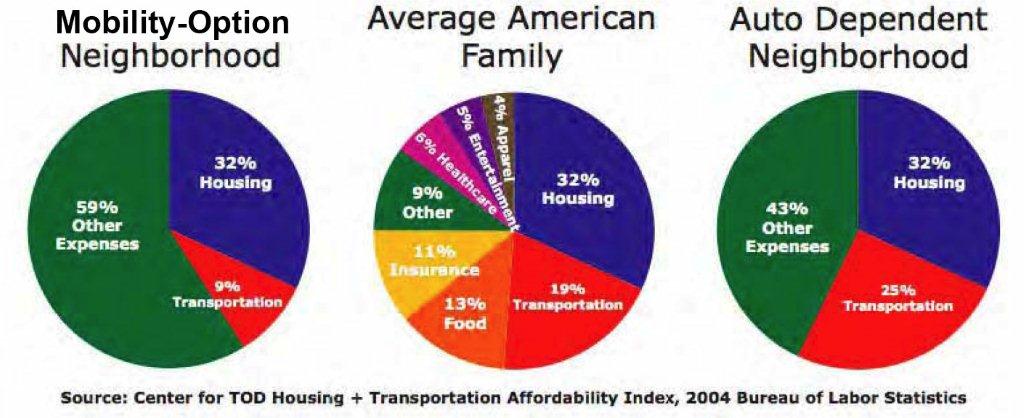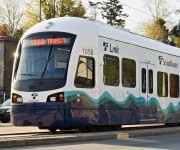A report released Thursday by the House Democratic Livable Communities Task Force recognized that families living in auto-dependent neighborhoods spend significantly more money on transportation, with fewer dollars available for health care, food, and other family expenses.
 In response, the two dozen representatives proposed a “Freedom from Oil” [PDF] agenda that would reduce oil use by providing families with more transportation choices, including cars that get 60 mpg by 2025.
In response, the two dozen representatives proposed a “Freedom from Oil” [PDF] agenda that would reduce oil use by providing families with more transportation choices, including cars that get 60 mpg by 2025.
Task force Chair Rep. Earl Blumenauer (D-Ore.), publicly released “Freedom from Oil” at a press conference joined by task force members Lois Capps (D-Calif.), Jim Moran (D-Va.), and Peter Welch (D-Vt.). They were joined by Daniel J. Weiss of the Center for American Progress (CAP) Action Fund and Jason Pavluchuk of the Association for Commuter Transportation.
The report notes that, on average, transportation is the second largest expense for households and that households located in neighborhoods that lack alternative transportation options are forced to spend significantly more to cover their transportation needs. Given limited U.S. oil reserves, “Freedom from Oil” recommends providing more transportation choices that do not heavily rely on oil.
Focusing on the impact of rising gasoline prices on Americans’ wallets and the lack of available transportation alternatives, the report establishes some important federal policy recommendations [PDF] to reduce dependence on oil and make communities more resilient and sustainable:
- Continue to increase fuel efficiency of passenger vehicles, which could save drivers the equivalent of $1.00-1.70 per gallon of gas.
- Promote pay-as-you-drive insurance, allowing consumers to pay less if they drive less.
- Encourage lenders to use transit accessibility and location efficiency as a factor in mortgage rates, taking into account the reduced spending on gas and making it easier to purchase a home that allows transportation savings.
- Provide consumers with information about the transportation costs associated with the location of a house through a tool like the Housing and Transportation Affordability Index.
- Use the tax code to encourage businesses to offer comprehensive commuter benefit programs that level the playing field for alternative, non-gas-dependent transportation.
- Increase federal funding for transit, including allowing capital funds to be spent on operations, helping transit agencies deal with increased fuel prices without compromising service or access.
- Increase funding for “Safe Routes to School” programs so that parents and children have the option to get to school safely without driving.
At Thursday’s press conference, Rep. Blumenauer said:
Unfortunately, about half of the American population doesn’t have an environment that they live in that provides those choices. Too much of America is dependent on a pattern that imagines that we will always have an unlimited supply of inexpensive gasoline, and government policies in housing, in road transportation, reinforce that. The recent events with the gasoline spike underscore that vulnerability … Our task force has issued a report, “Freedom from Oil,” that lists a variety of initiatives that would in fact make a difference.
Weiss of CAP noted that Americans currently have very few transportation choices, forcing them to continue to buy increasingly expensive gasoline:
Without the ability to easily buy or rent another home, switch jobs, or transfer schools, Americans’ wallets collapse and expand with the rise and fall of gasoline prices. Despite this year’s price hike, gasoline consumption is the same as a year ago because of a lack of transportation options. These proposals will give Americans the alternative transportation choices necessary to dramatically cut oil use, save families money, create jobs, and restore America’s manufacturing might.
“Make no mistake, in 10 or 20 years, if oil and gas are still at the center of our debate, then we have failed,” Rep. Capps said as she discussed the importance of reducing oil use.
Moran said that development around public transit had proven to be an economic success for his district in northern Virginia. “People can work and shop and play without having to get in an automobile,” he said.
The Livable Communities Task Force is a group of House Democrats formed in 2009 by Blumenauer that is committed to reducing American dependence on oil, supporting strong environmental protections, and investing in housing and transportation projects that create jobs and allow for more commuting choices.



